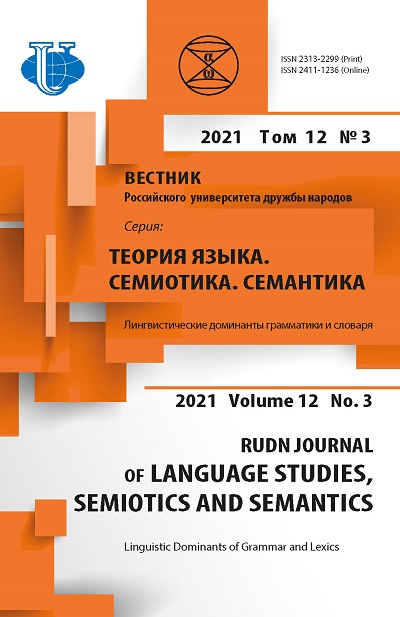Motivation of Word Formation in Russian and Arabic Languages and its Role in Achieving Translation Equivalence
- 作者: Al-Foadi R.A.1, Zarytovskaya V.N.2, Al-Roznamachi R.H.1
-
隶属关系:
- University of Baghdad
- Peoples’ Friendship University of Russia (RUDN university)
- 期: 卷 12, 编号 3 (2021): Linguistic dominants of grammar and lexics
- 页面: 652-668
- 栏目: FUNCTIONAL SEMANTICS AND LINGUISTIC SEMIOTICS
- URL: https://journal-vniispk.ru/2313-2299/article/view/323357
- DOI: https://doi.org/10.22363/2313-2299-2021-12-3-652-668
- ID: 323357
如何引用文章
全文:
详细
The article is devoted to the issue of word-formation motivation, which does not lose its relevance and plays a role not only in disclosing formal-semantic relations between words of one language and has not only theoretical, but also applied significance. The authors consider word-formation motivation consistently in its varieties in a comparative way on the materials of so different languages as Russian and Arabic and approach the mechanism of achieving semantic equivalence of translation. To the greatest extent, word-formation activity today, due to objective reasons, affects some special branch (technical, medical, etc.) vocabulary, which is increasing from year to year in national dictionaries. This extensive material, selected by the authors, not only illustrates the current trends in word formation in modern languages, but also provides an answer to the question about the degree of equivalence of this subgroup of words in Russian and Arabic. The goal to compare word-formation motivation according to a number of criteria in different-structured languages made possible not only to obtain theoretical information about what features each of the languages has in word formation and what derivational potential it has, but also to reveal an algorithm for translating derived words from one language to another. For this, the authors complete a number of such particular tasks as highlighting significant elements in the neologisms of the Russian and Arabic languages, establishing standards for the formation of scientific and terminological vocabulary in Arabic, searching for tools (transformation operations, specific word-formation formants) that will contribute to the achievement of translation equivalence from Russian to Arabic, etc. Also the analysis of differences in the mechanisms of the formation of new vocabulary in the Russian and Arabic languages provided an opportunity to supplement the relatively young and rapidly developing private methodology of Russian-Arabic translation.
作者简介
Raheem Al-Foadi
University of Baghdad
编辑信件的主要联系方式.
Email: raheem.ali@cis.uobaghdad.edu.iq
ORCID iD: 0000-0001-8699-9596
Doctor of philological sciences, Associate-Professor of the Russian Language Department, College of Languages
Al-Jadiriya, al-Karrada quarter, Baghdad, Iraq, 10001Victoria Zarytovskaya
Peoples’ Friendship University of Russia (RUDN university)
Email: widaad@yandex.ru
ORCID iD: 0000-0001-9910-7913
PhD of pedagogical sciences, Associate-Professor of the Department of Foreign Languages, the Faculty of Humanities and Social Sciences
6, Miklukho-Maklaya str., Moscow, Russian Federation, 117198Ragad Al-Roznamachi
University of Baghdad
Email: raghad.hani191.rh@gmail.com
ORCID iD: 0000-0002-5083-1924
Department of Russian Language, College of Languages
Al-Jadiriya, al-Karrada quarter, Baghdad, Iraq, 10001参考
- Beljaeva, M.J. (2017). Usual-occasional derivational nests with zoonyms tops. In: Theory and practice of onomastic and derivatological research. Majkop: Magarin O.G. pp. 380—397. (In Russ.).
- Blinova, O.I. (1984). The phenomenon of word motivation: the lexicological aspect. Tomsk: TGU. (In Russ.).
- Boldyrev, N.N. & Panasenko L.A. (2013). Cognitive basis of lexical categories and their interpretive potential. Issues of Cognitive Linguistics, 2, 5—12. (In Russ.).
- Kozinec, S.B. (2002). Partial metaphor in Russian. In: Sentence and word. Saratov: SGU. рр. 416—421. (In Russ.).
- Shirshov, I.A. (1999). Theoretical problems of words formation. Moscow: Prometej. (In Russ.).
- Raciburskaja, L.V. (2004). On the typology of word-formation motivation (on the example of word-formation chains with words of a unit structure). Philological studies: a collection of articles by young scientists. pp. 193—198. (In Russ.).
- Hodunova, T.N. (2010). Word-formation nest with the top “move”: history and current state: [dissertation]. Moscow. (In Russ.).
- Vinokur, G.O. (1959). Notes on Russian word formation. Morphology Text: a course of lectures. In: Selected works on the Russian language. Moscow: Gosuchpedgiz. рр. 419—443. (In Russ.).
- Zemskaja, E.A. (1989). Modern Russian language. Moscow: Vysshaja shkola. (In Russ.).
- Ibn, Faris & Abu Al-Hussein, Ahmad Ibn Zakaria (1979). Dictionary of Language Standards. Jordan: Dar Al-Fikr. (In Arab.).
- Jabal, M.H. (2006). The theoretical and practical derivation. Cairo: Literature Library. (In Arab.).
- Mubarak, M. (2005). Philology and characteristics of Arabic. Lebanon: Dar Al Fikr. (In Arab.).
- Fortunatov, F.F. (2010). Comparative linguistics. Moscow: Krasad. (In Russ.).
- Al-Foadi, Raheem Ali (2018). Cognitive Elements and Criteria of the Progressive Inflectional System in Modern Russian Language in The Process Of Verbal Communication (Cognitive Word-Formation Analysis Of The Word Structure). Modern Journal of Language Teaching Methods (MJLTM), 8(6), 104—109.
- Uluhanov, I.S. (1971). Word-formation motivation and its types. News of the USSR Academy of Sciences. Literature and Language Series, 1, 37—46. (In Russ.).
- Dictionary of the Russian language (1985—1988). Moscow: Russkij jazyk. (In Russ.).
- Nizametdinova, N.U. (2003). Historical composition as an object of research. Philological sciences, 6, 71—81. (In Russ.).
- Al-Askari & Abu Hilal Al-Hassan bin Abdullah bin Sahl (1952). The Two Industries Book. Writing and Poetry. Cairo: Al-Babi Al-Halabi. (In Arab.).
- Shinawa, Suad Shaker (2007). The Semantic Level in the Rhetorical Arts. Al-Qadisiyah Journal of Literature and Educational Sciences, 6(3—4), 105—116. (In Arab.).
- Al-Jurjānī, ʿAbd al-Qāhir ibn ʿAbd al-Raḥmān (1954). The Secrets of the Rhetoric. Istanbul: Ministry of Knowledge. (In Arab.).
- Maghmuli, Ismail (2004). The term in the Arab Islamic heritage and the methods of its development. Arab Heritage Journal, 93—94, 27—37. (In Arab.).
- Janko-Trinickaja, N.A. (2001). Word formation in modern Russian. Moscow: Indrik. (In Russ.).
- Wallmach, Kim (2006). Feminist translation strategies: Different or derived? Journal of Literary Studies, 22(1—2), 1—26.
补充文件








